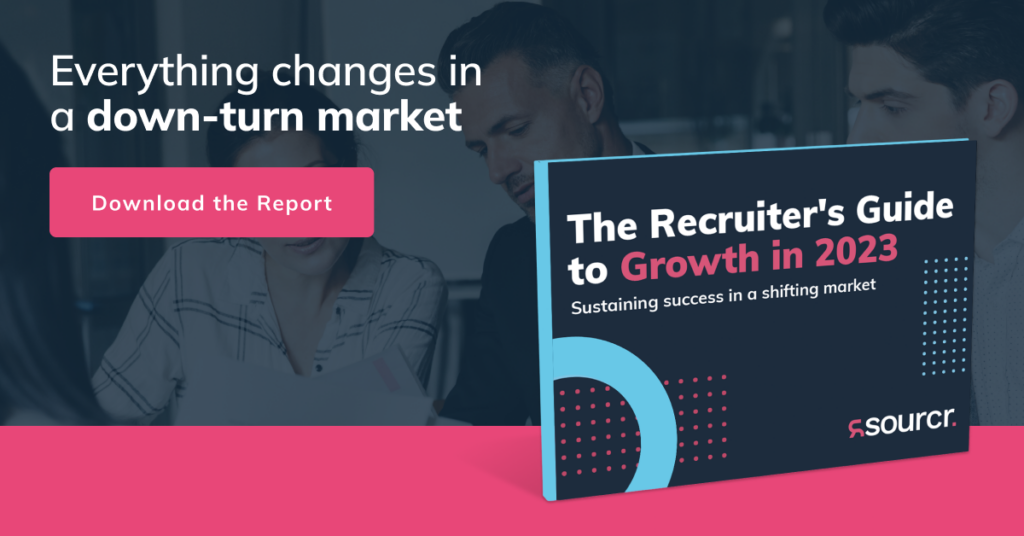Whether your clients are new or long-standing, when third party recruitment spend becomes more heavily scrutinised and less of a necessity, your ability to secure it rests on more than the sales pitch.
You need to offer what your client doesn’t have.
Be that in the form of an internal recruitment team, or the MD who does recruitment themselves.
So what can you offer that they don’t have?
Time, the power of attraction and future supply.
1. Time
Every single one of your clients wishes they had more time. And in a market which becomes job-led, a lot of that time gets spent assessing and benchmarking potential talent.
More talent comes direct, and so admin increases.
This is a resource you can save for them. Don’t underestimate that.
Candidates with skills that increase business capability and output remain crucial. That includes a heavy weighting on diverse talent too.
Almost every study ever done shows diversity impacts the bottom line.
One study even found that businesses with more diverse executives were 36% more likely to see above average profits.
If you’re not elevating your outreach to profit-driven consultancy, it’s time you did.
Sell on the basis of their success.
Delivering time-saving activities like salary benchmarking, info on future talent shortages, diversity reports and competitor analyses will save your clients’ time and justify your worth.
Far beyond active CV submissions. Which, in a job-led market, they have in ready supply anyway. You need to be far more than an application machine. You need to offer more benefit than job boards can.
Time is money.
Streamline their process, save them time, increase their success and you’ll reinforce your worth.
2. Attraction
Better advertising, more effective copywriting and personal networks become even more important in job-led markets.
Recruiters with incredible personal brands have greater access to passive and top percentile candidates. And whilst those increase in job-led markets, there’s not a single end client in recruitment who doesn’t believe they want the best.
Of course, whether they genuinely need the best, and if they’re willing to pay for that is another story.
Sourcr makes getting testimonials a breeze for recruiters. Increasing the proclivity for candidates to trust an individual recruiter makes others far more likely to do so, knowing they’re a safe pair of hands.
And reducing nerves, unknowns and distrust on the candidate journey is something that directly impacts the client. Your client.
It’ll improve their brand and once again make them money.
It’s your job to inform them of this and show your worth to their brand.
The recruiter is so often the face of the client. The first thing a candidate sees.
Bad recruiters write poor job ads. Their representation of the client is sub-par. And likely the candidates they represent. They don’t have an abundance of positive recommendations. And the journey for the candidate is negative.
This not only damages you, the recruiter, but the clients you work with.
Make sure your candidate journey, from job ad to placement, is a positive one and you’ll set yourself apart.
Analyse it. Benchmark it. Improve it.
Consult with the client, and advise if their contribution’s letting them down. You are, when all’s said and done, a consultant. And consultants often deliver bad news if it needs to be heard.
Through better attraction, greater copywriting and wider networks, you’ll elevate your ability from your competitors.
3. Future supply
Your ability to work solely in the market of recruitment means you’re one step ahead of every client. Whether they have an internal recruitment team or not.
You already know great personal brands can eclipse company brands with ease. As much as you love the brand you work for, the stats tell us individuals have far greater impact, in this industry and others.
It’s why Elon Musk has more followers than Tesla, or SpaceX. And why Bill Gates has more than Microsoft.
In an industry like recruitment where your individual work forms the basis of fees generated for your business, it might be even more dramatic.
And so asking for the tools and time needed to grow, nurture and develop your personal brand is a positive. It’s good for everyone.
Your life will be easier, and your employer more successful.
A good personal brand makes your access to the market easier. And access to market is what you sell.
Future-proofing that seems like obvious advice then.
But relating this back to your clients is another way to ensure you retain their services further down the line.
-
What events are you holding for the talent they might need in 2 years?
-
What skills are likely to be in shorter supply?
-
What are you doing as a business to ensure their talent pool remains diverse and robust?
-
Where are new entrants to the industry coming from?
-
And what chance do your clients have of securing them?
Whether the nature of your business is contingent or retained, there’s always a tendency to focus on the here and now in recruitment.
Guiding the glance of your client towards the future means you’re a valuable long-term asset. And that will help immeasurably with your client retention stats, as you rise to the position of advisor.
Find out more about the recruitment market shift and how to prepare your teams and avoid losing profits in 2023. Download the free eBook today.








